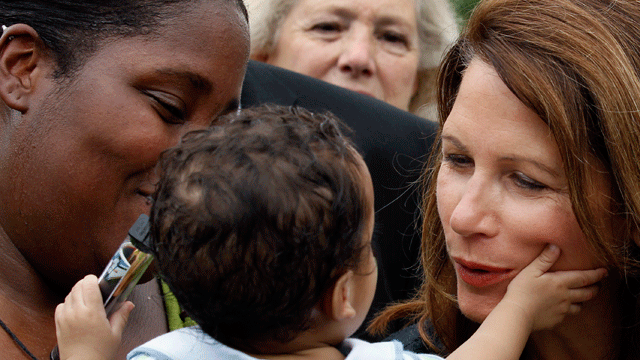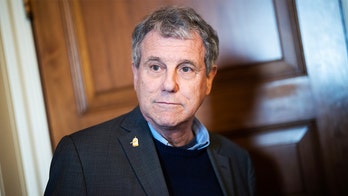
Tea Party caucus leader Rep. Michele Bachmann, R-Minn., plays with Danille Hollars' son Damian Hollars, 9 months, both from Woodbridge, Va., at a news conference on Capitol Hill in Washington Wednesday, July 21, 2010.(AP)
The newly formed Congressional Tea Party Caucus made its debut Wednesday morning and then showed off the racial and ethnic diversity of the movement at a news conference following its first meeting.
Several Tea Partiers from across the country denounced charges, which have rocked the movement in the last week, that there are racist elements within the group.
The NAACP adopted a resolution last week condemning "racist elements" in the Tea Party movement and calling on its leaders to repudiate bigotry -- a move that Tea Partiers dismissed as a political ploy.
But the movement showed signs of racial friction over the weekend when the National Tea Party Federation ousted a prominent Tea Party group for refusing to rebuke its spokesman, who had posted a satirical blog that referred to NAACP president Benjamin Jealous as "Tom's nephew and NAACP head colored person."
A black Tea Party activist at Wednesday's news conference said she resented the allegations that Tea Party rhetoric was racist and that anyone who participated in the movement was racist. A Hispanic member said he joined the movement to protest big government and what he sees as the country's movement toward a socialist democracy.
"I think you heard today from people across the country from various ethnic groups about how they feel about this government and the Tea Party Movement," Rep. Dan Burton, R-Indiana, said at the news conference. "That should dispel an awful lot of the rumors about racism and other things, because we have people of all different backgrounds here today to talk about how they feel about American constitutional government and more taxes and less spending."
Neither the Congressional Black Caucus nor the Hispanic Congressional Caucus responded to requests for comment.
Rep. Michele Bachmann of Minnesota championed the effort by asking House Speaker Nancy Pelosi late last week if she would allow lawmakers to form a Tea Party caucus.
"We decided to form a Tea Party caucus for one very important purpose -- to listen to the concerns of the Tea Party," Bachmann, a Republican, said at the news conference. "Now, what we are not: we are not the mouthpiece of the Tea Party. We are not taking the Tea Party and controlling it from Washington, D.C. I am not the head of the Tea Party, nor are any of these members of Congress the head of the Tea Party movement. The people are the head of the Tea Party movement in all of their form."
As of Wednesday morning, 29 House members, all Republicans, had joined the caucus, including Mike Pence of Indiana, Pete Hoekstra of Michigan, Paul Broun of Georgia, Todd Tiahrt of Kansas, John Carter of Texas and Cliff Stearns of Florida.
The lawmakers said they are not part of the Tea Party Movement, but they do support its broad principles: lower taxes, reduced spending and smaller government.
Caucuses are informal groups sanctioned by the House. They come in all shapes and forms. Some focus on regional interests, such as the Western Caucus. Others devote their time to industry, such as the Steel Caucus. Still, others advocate specific policy positions, like the Out of Iraq Caucus.
Congress allocates no money for a caucus. But some congressional resources may be used to handle caucuses' official business.
Fox News' Carl Cameron and Chad Pergram and FoxNews.com's Stephen Clark contributed to this report.




